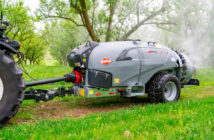The Scottish Machinery Rings Association (SMRA) has again supported thousands of farmers and rural businesses through a successful harvest season, despite energy and labour difficulties.
The nine-strong rings that make up SMRA collectively represent over 7250 member businesses, spans the length and breadth of Scotland, delivering extensive services to their members, ranging from machinery and commodity provision, to training and skills development.
With energy prices being of heightened concern, Michael Bayne, Manager at the Borders Machinery Ring acknowledges that “farm input inflation is a real worry going forward, with enterprise margins certainly being affected.
“However, using the combined buying power of our co-operative, we were able to fix a price for Gas Oil over 9 months from March to November at 54.1ppl. We have reminded members who still have fuel volume to draw down to make sure this is done before 30 November because the current spot price is now significantly higher at over 70ppl.
“Market volatility looks set to remain, but the fuel fixed pricing that we offer to members can help them plan ahead, budget and reduce risk.”
Bruce Hamilton, chief executive at Tayforth Machinery Ring, echoes this position of collective power and said: “A dry harvest meant that volumes of Gas Oil were down for us between June and September, but the price is 40% higher than last year. With everyone talking about these incredible increases in costs, we know how worrying the outlook is for farmers.
“Fortunately, we had already fixed prices for fuel for this harvest, so it insulated our members from market price increases during this time.”
During this challenging climate, the Machinery Rings’ buying power enables them to solidify forward contracts and provide a degree of certainty for all sizes of businesses; this includes for utilities, fertiliser and other inputs.
The Machinery Rings have been one of the keystones of Scottish agriculture in recent times, and their success is evidenced through their expanding network of farmers, contractors and rural businesses. Bruce Hamilton points out that “unlike a limited company, the profits that they secure are not taken out of the business, but instead reinvested back into the rings which are all cooperatives.”
To find out more




